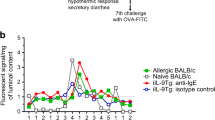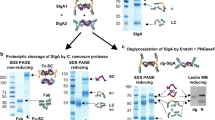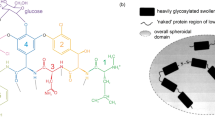Abstract
ALTERED mucosal penetrability for food constituents and microbial components probably underlies the pathogenesis of a variety of diseases occurring in mucous membranes and distant sites such as liver and joints1. The secretory immune system seems to be of major importance in mucosal exclusion of foreign material and is stimulated by topical antigens2. Conversely, parenteral immunisation almost exclusively gives rise to circulating antibodies which are chiefly of the IgG class. IgG is not a secretory immunoglobulin in man, monkey, rabbit and guinea pig3, and contradictory information has been published about the effect of parenteral immunisation on the absorption of antigen through mucous membranes. Moreover, a possible influence on the concurrent mucosal penetration of unrelated macromolecules has not been considered previously. We report here that although serum-derived antibody retards the penetration of corresponding antigen, it nevertheless causes impairment of the mucosal barrier. Induction of IgG antibodies may thus cause hazardous side effects by altering mucosal penetrability.
This is a preview of subscription content, access via your institution
Access options
Subscribe to this journal
Receive 51 print issues and online access
$199.00 per year
only $3.90 per issue
Buy this article
- Purchase on Springer Link
- Instant access to full article PDF
Prices may be subject to local taxes which are calculated during checkout
Similar content being viewed by others
References
Walker, W. A. Pediat. Clins N. Am. 22, 731 (1975).
Heremans, J. F. in The Antigens 2 (ed. Sela, M.) 365–522 (Academic, London, 1974).
Ballabriga, A., Hilpert, H. & Isliker, H. Nestlé Res. News (1974/75) 25.
Tolo, K. & Jonsen. J. Archs. oral Biol. 20, 419 (1975).
Tolo, K., Brandtzaeg, P. & Jonsen, J. (submitted for publication).
André, C., Lambert, R., Buzin. H. & Heremans. J. F. Eur. J. Immun. 4, 701 (1974).
Brandtzaeg, P., Fjellanger, I. & Gjeruldsen, S. T. Scand. J. Haematol. Suppl 12, 1–83 (1970).
Nencioni, T., Brambati, B. & Crosignani, P. G. Gynéc. Obstét 69, 219 (1970).
Kingham, J. G. C., Whorwell, P. J. & Loehry, C. A. Gut 17, 354 (1976).
Walker, W. A., Isselbacher, K. J. & Bloch, K. J. J. Immun. 111, 221 (1973).
McDougall, W. A. J. periodont. Res. 9, 153 (1974).
Walker, W. A., Wu, M., Isselbacher, K. J. & Bloch, K. J. J. Immun. 115, 854 (1975).
Bockman, D. E. & Winborn, W. B. Anat. Rec. 155, 603 (1966).
Brandtzaeg, P. in The Oral Mucosa in Health and Disease (ed. Dolby, A. E.) 137–213 (Blackwell, London, 1975).
Brandtzaeg, P. & Baklien, K. Scand. J. Gastroenterol. 11, Suppl. 36, 1–45 (1976).
Bellamy, J. E. C. & Nielsen, N. O. Infect. Immunity 9, 615 (1914).
Goldstein, I. M. Prog. Allergy 20, 301 (1976).
Craighead, J. E. J. infect. Dis. 131, 749 (1975).
Editorial in Br. med. J. 1, 1167 (1976).
Author information
Authors and Affiliations
Rights and permissions
About this article
Cite this article
BRANDTZAEG, P., TOLO, K. Mucosal penetrability enhanced by serum-derived antibodies. Nature 266, 262–263 (1977). https://doi.org/10.1038/266262a0
Received:
Accepted:
Published:
Issue Date:
DOI: https://doi.org/10.1038/266262a0
This article is cited by
-
Air–liquid interface cultures enhance the oxygen supply and trigger the structural and functional differentiation of intestinal porcine epithelial cells (IPEC)
Histochemistry and Cell Biology (2011)
-
Food allergy: separating the science from the mythology
Nature Reviews Gastroenterology & Hepatology (2010)
Comments
By submitting a comment you agree to abide by our Terms and Community Guidelines. If you find something abusive or that does not comply with our terms or guidelines please flag it as inappropriate.



